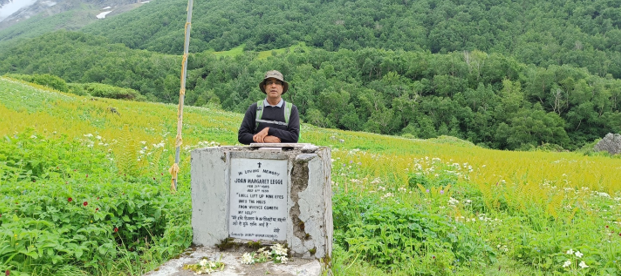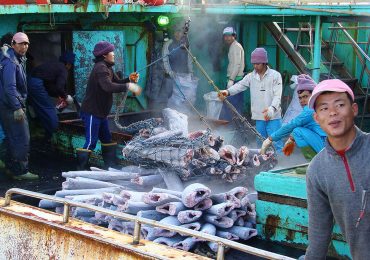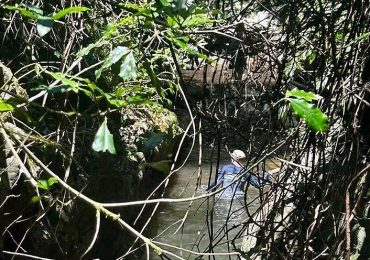In this blog post, we hear from Associate Editor Shyam S. Phartyal, Professor at Mizoram University, Aizawl, India. Shyam is a plant ecologist with primary research interests in exploring the fascinating world of wild plant regeneration through seeds across diverse ecosystems, from wetlands to woodlands. His research investigates how environmental factors shape seed traits and how these traits, in turn, influence species distributions and community assembly. This understanding informs strategies for germplasm conservation and the use of native species in ecosystem restoration. Beyond seed ecology, he actively promotes citizen science as a tool to connect people with nature and democratize biodiversity monitoring, whilst also pursuing research in plant–herbivore interactions, plant phenology, and microclimate ecology. His broader mission is to advance seed ecology in India, mentor the next generation of ecologists, and foster collaborations to study the seed ecology of wild species.
Why did you choose to study your particular research area?
I grew up playing on the terraced agricultural fields of my village called Pilkholi in the Kumaun Himalaya (India), helping my parents in the fields and herding cattle into nearby forests. Surrounded by the wilderness of pine-dominated mixed forests, I spent my childhood playing with pine cones and oak acorns, often collecting wild seeds to grow. Some germinated quickly, others not at all. Those early, mostly unsuccessful attempts were the little steps that led to a larger question: why do seeds of some species germinate quickly while others fail? This curiosity led me to pursue an MSc/PhD in Forestry, researching the seed ecophysiology of Himalayan maple and elm.
Over the past three decades, I have worked across Himalayan temperate and subtropical forests, Brussels’ city woodlands, Hokkaido’s cool-temperate understory, and Central European wetlands, studying seeds. What excites me is that seeds, though tiny, determine the fate of plant communities and the resilience of whole ecosystems. Every time I hold seeds from an unstudied wild species, I still feel that same childhood curiosity, wondering how they behave ecophysiologically and eager to solve a puzzle. Will they be short- or long-lived? Dormant or non-dormant? What cues will trigger their germination? This enduring curiosity continues to drive my research.
What are the current challenges/questions in ecology that you hope to address?
A major challenge in plant ecology is the limited knowledge of regeneration strategies for most wild species. In much of the Global South, particularly in Asia and Africa, restoration and greening projects often focus on a narrow set of easily regenerable species, overlooking a broader pool with complex seed ecophysiological traits or those difficult to propagate. This reliance on a homogeneous set of easily propagated and commercially available species limits both the ecological outcomes and the biodiversity value of such projects. My research seeks to address this gap by generating and synthesizing data on seed functional traits of wild flora. Even small datasets on less-explored species can help guide more diverse and ecologically sound restoration/conservation efforts.
What is one of the biggest challenges you’ve faced in your career?
I completed my PhD in India and later worked in Belgium, Japan, and Germany, where seed ecology/biology is a well-recognized and well-funded subdiscipline of plant science. In India, however, I feel seed ecology is often viewed as a routine nurseryman’s task rather than a core scientific subdiscipline, leading to little recognition, limited funding, and few career opportunities, especially compared to lab-based biotechnology and molecular plant sciences.
Even within ecological science, there is a positive bias toward charismatic fauna and the researchers who study them, a pattern I call “academic plant blindness.” This has often meant working with minimal resources and few students, relying on limited means but strong curiosity to explore the hidden world of seeds. Over time, I have learned to excel by building strong global collaborations and pursuing questions of both local relevance and global significance. These experiences have certainly made me adaptive, collaborative, and persistent, while my international exposure has helped bring a global perspective to seed ecological research in India.
Collecting mudflat samples from dry fishponds in Germany and seeds of wetland plants in Germany and Croatia (Photo credit: Prof. Peter Poschlod).
What is next for your research?
With my collaborator, I plan to revisit the classification of seed dormancy (a delay in germination under otherwise favourable conditions), focusing on the timing of epicotyl emergence. In seeds with epicotyl dormancy (ePD), radicle emergence may occur quickly, as in non-dormant seeds, but shoot emergence is substantially delayed, representing an ecologically key yet often overlooked phase of germination. Traditional germination monitoring often stops at radicle emergence, risking misclassification of seed dormancy. We advocate tracking “full germination,” from sowing to the appearance of the first true leaves, to capture this dynamic accurately. Another line of research is to test whether regeneration traits influence global urban tree selection more than their aesthetics or ecosystem services, considering that only ~8% of ~70,000 tree species are currently used in urban greening, which may be due to limited knowledge of their regeneration traits. Finally, I aim to develop a comprehensive seed functional trait database for Indian plants to support global trait initiatives for species restoration and conservation.
Why Functional Ecology and how do you find being an Associate Editor?
Functional Ecology is respected for its quality and commitment to scientific integrity, offering a trusted platform for rigorous research across trait-based ecological disciplines. Personally, publications on plant functional traits in Functional Ecology and the work of my former Humboldt Fellowship host in Germany, Prof. Peter Poschlod, have deeply influenced my research, encouraging me to adopt a trait-based approach beyond traditional seed science.
I find being an Associate Editor beneficial as it is intellectually rewarding to stay updated with emerging ecological research and contribute to scientific discourse. The main challenge is balancing editorial duties with my own teaching, research, and family time, especially when multiple submissions in my expertise arrive within a short span. Reading each manuscript thoroughly and making decisions on time can be demanding.
I feel it has benefitted my own research as handling diverse manuscripts has broadened my perspective beyond my core research, exposing me to new questions, trends, and methods in ecology that often inspire fresh ideas. This broader view helps me guide prospective students with varied interests toward suitable research topics. Serving as a handling editor has also deepened my understanding of the publication process, improving my peer-review and scientific writing skills. Overall, this role enriches my research and supports my academic growth.
Any common mistakes you see? How might these be addressed?
Most submissions to Functional Ecology are well-prepared, but a common pitfall is assuming that editors or reviewers can “read between the lines.” Key reasoning often remains unexpressed, making their task harder. Since editors and reviewers may not be specialists in that exact subfield, a clear, well-structured manuscript ensures the narrative is explicit, well-supported, and easy to follow, improving its chances at every stage.
What do you think are some of the biggest challenges in the field of ecology and what one thing would you change?
A major challenge in ecology today is societal ecological blindness, treating all open landscapes as suitable sites for tree plantations. This overlooks the ecological value of Open Natural Ecosystems (grasslands, savannas, scrublands), which are often mislabelled as “wastelands” and targeted for afforestation. These ecosystems are vital for ecological balance, so improving ecological literacy among all stakeholders, particularly policymakers and planners, is essential to overcome this misconception.
I would like to make ecology more inclusive, equitable, and globally representative by amplifying voices from the Global South and reducing parachute science (doing research in a remote place without involving locals). This means supporting their roles in formulating research questions, participating in research design, gaining co-authorship, attending conferences, joining editorial boards, and ensuring open-access publishing without hidden costs or barriers, so they can fully engage in global ecological knowledge creation.
Any submissions you would like to see more of or advice for early career researchers?
I’d like to see more submissions from underrepresented regions, especially the Global South in Asia and Africa, where biodiversity is high but ecological data are limited. Research from these areas can provide valuable insights into functional trait dynamics across diverse gradients. In particular, I welcome studies that integrate plant ecology within broader functional frameworks, linking seed and regeneration traits to species coexistence, dispersal, and climate resilience.
My advice would be to communicate your findings clearly to diverse audiences, peer reviewers, and local communities alike. Publishing is about telling a compelling ecological story. Follow your curiosity and choose questions that excite you and have ecological or societal relevance. Don’t rush to publish; good science takes time. Start with small, focused questions and build toward bigger issues. Seek mentorship, collaborate generously, and build global networks. Ecological science must act locally to create a global impact!
Leave a comment





